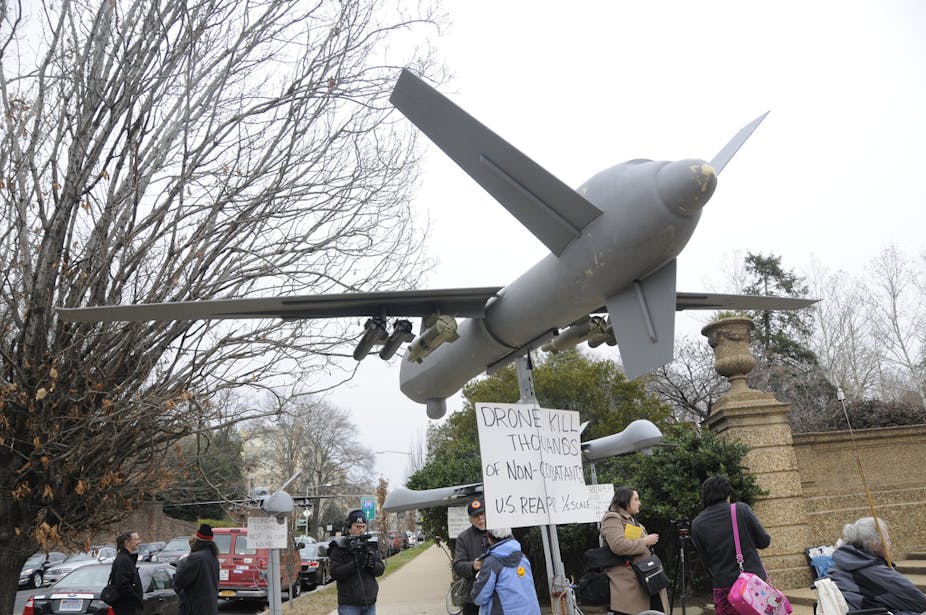When is a government entitled to kill its own citizens? That’s the question at the centre of recent revelations that the Obama administration might conduct a strike against an American suspected of plotting terror attacks.
The story, coming only eight months after US president Barack Obama announced new regulations on targeting militants, makes one wonder whether US policy has really changed.
Unfortunately, the story is likely to generate more enthusiastic moralising than hard analysis. The fact that the American in question is currently overseas – and that a drone strike is the logical way to get to him – muddies the water even further. It allows some to screech “Traitor!” and demand his immediate automated obliteration. Others, however, will dutifully trot out slogans about US imperialism and the sinister military-industrial complex.
This is a pity, because the case raises more interesting questions about politics and power than about civil liberties or empire. They concern sovereignty’s blurry lines between domestic and international jurisdictions.
Just as important is the debate about using drones to kill. So too is the enactment of cosmetic legal changes for public consumption. Tackling these thorny issues might also help clear up some misconceptions.
Sovereignty
Nation-states still care about sovereignty. It is certainly a violation of sovereignty if the US strikes a foreign government’s territory without its permission. While the UN Security Council can authorise it in extreme cases like genocide, the much-heralded Responsibility to Protect has become pretty moribund, especially after Syria.
Even so, nations routinely compromise each other’s sovereignty. They do it through espionage, whether via human intelligence or bugging foreign leaders. They do it through state-sponsored cyberattacks, planting operatives in otherwise well-meaning NGOs, and by encouraging opposition groups to overthrow their governments. They sometimes even do it during humanitarian interventions.
As political scientist Stephen Krasner put it, sovereignty is effectively organised hypocrisy. In other words, each country loves to violate the sovereignty of others, but is outraged when its own affairs are subjected to external meddling.
Drones as killers
Drones aren’t yet killer robots making the decision to shoot independently. They are stand-off weapons that can quietly and quickly neutralise threats while protecting the operator’s physical security. Viewed that way, drones aren’t that different to other weapons systems that have been around for a long time.
So-called “fire and forget” cruise missiles and “smart” bombs function under the same principle, as do nuclear weapons. Increasing the survivability (and hence effectiveness) of one’s troops, either through armour or distance, has long been an obsession of military technologists. The bow and arrow, siege weapons, artillery, tanks and air power were all at least partly the product of this.
Obama’s revised guidelines on drone policy transferred control of drones from the CIA to the Pentagon. The idea is that the CIA can monitor, but only the Defense Department can shoot. It also restricted their use outside of war zones to al-Qaeda linked individuals seen as an “imminent threat to US persons”. And Department of Justice approval is now required before any US citizen is added to the kill-list.
Changed nature of US drone policy?

On the surface, Obama’s amendments seem rigorous, but in reality they are little more than window-dressing. A warzone is just as much of a grey area as an enemy combatant, and “al-Qaeda” these days is a vague hub for justifying specific self-determination campaigns rather than a coherent global movement.
Making the Pentagon responsible for drones only technically legitimises them as weapons of war. And US citizens overseas suspected of plotting terrorism don’t get to have their culpability tested by the courts. Instead, the Department of Justice creates the lists and the executive approves them.
As Obama himself put it, US citizenship:
…should no more serve as a shield than a sniper shooting down on an innocent crowd should be protected from a SWAT team.
Nonetheless, these arguments still come up against hard realities. To treat terrorism only as a crime means restricting yourself to retributive justice. Put simply, someone must actually carry out an act of terror, and/or be caught in the act before courts can get involved.
Like any leader, Obama must protect his nation’s interests: chiefly, ensuring its citizens’ security. To wait until plots succeed, or rely on the agility of law-enforcement agencies – often overseas and beyond US control – is fraught with danger.
The consequence is that people, often innocent ones, will continue dying in order to prevent attacks. But with global sentiment turning against drones as tools of extra-judicial killing, Obama needed to be seen as taking the problem seriously without unduly compromising America’s ability to respond to threats.
So, is the Obama administration lying when it says it has fettled its drones? Well, yes and no. It’s another reminder that even in democracies leaders are often economical with the truth. The difference with authoritarian states is that they generally rely on a few whopping untruths.
Democracies, conversely, tell “white lies”. Unfortunately, they also tend to tell rather a lot of them.

